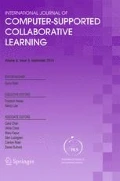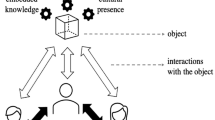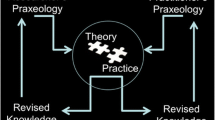Abstract
Teachers and students face many challenges in shifting from traditional classroom cultures to enacting the Knowledge-Building Communities model (KBC model) supported by the CSCL environment, Knowledge Forum (Bereiter, 2002; Bereiter & Scardamalia, 1993; Scardamalia, 2002; Scardamalia & Bereiter, 2006). Enacting the model involves socializing students into knowledge work, similar to disciplinary communities. A useful construct in the field of the Learning Sciences for understanding knowledge work is “epistemic games” (Collins & Ferguson, 1993; Morrison & Collins 1995; Perkins, 1997). We propose that a powerful means for supporting classroom enactments of the KBC model entails conceptualizing Knowledge Forum as a collective space for playing multi-player epistemic games. Participation in knowledge-building communities is then scaffolded through learning the moves of such games. We have designed scaffolding tools that highlight particular knowledge-building moves for practice and reflection as a means of supporting students and teachers in coming to understand how to collectively work together toward the progressive improvement of ideas. In order to examine our design theories in practice, we present research on Ideas First, a design-based research program involving enactments of the KBC model in Singaporean primary science classrooms (Bielaczyc & Ow, 2007, 2010; Ow & Bielaczyc, 2007; 2008).












Similar content being viewed by others
Notes
Refer to http://www.ikit.org
In past publications we have referred to this epistemic game as the “Progressive-Investigation Game.” Here we change to a name that conveys more clearly the key goal of the game --- the progressive improvement of ideas.
It should be noted that the Knowledge-Building Communities model and the name of its associated software, Knowledge Forum, have become quite synonymous in educational circles over the years. It is not uncommon for people to refer to classrooms that have adopted the model as “Knowledge Forum classrooms.”
Note that we did not speak of “interactions among the players themselves,” but instead of “interactions among the player’s contributions.” In KBC classrooms, just as in disciplinary communities, the players need not engage each other personally for their contributions to interact and lead to advances in the community’s knowledge. Of course, as in disciplinary communities, personal interactions and collaborations among students can also play a valuable role within the classroom community.
This Ministry of Education policy emphasizes curricular depth over breadth.
It should be noted that the Ideas First curriculum maintained the original curricular objectives. However, “coverage” was not achieved through a linear sequence of topic-by-topic alignment to curriculum guidelines, but rather a more interconnected approach. Lampert (1996) details such approaches to curriculum coverage.
Quote adapted from Bereiter (2002).
Students work on a common problem of understanding that is provided to the whole class in order to address curricular time constraints due to high-stakes testing. In Singapore, the school year comprises four 10-week terms. In this school there were 2–2.5 h of Science scheduled per week in Primary 3 and 4, and an exam period at the end of every term. There is also a national curriculum specifying science objectives to be covered in preparation for the Primary School Leaving Exam (PSLE), a national exam given at the end of Primary 6.
References
Ballenger, C. (2009). Puzzling moments, teachable moments: practicing teacher research in urban classrooms. New York: Teachers College Press.
Bereiter, C. (2002). Education and mind in the knowledge age. Mahwah, NJ: Lawrence Erlbaum Associates.
Bereiter, C., & Scardamalia, M. (1993). Surpassing ourselves: An inquiry into the nature and implications of expertise. Chicago: Open Court.
Bielaczyc, K. (2006). Designing social infrastructure: Critical issues in creating learning environments with technology. Journal of the Learning Sciences, 15(3), 301–329.
Bielaczyc, K. (2013). Informing Design Research: Learning From Teachers’ Designs of Social Infrastructure. Journal of the Learning Sciences, 22(2), 258–311.
Bielaczyc, K., & Collins, A. (2006). Implementation paths: Supporting the trajectory teachers traverse in implementing technology-based learning environments in classroom practice. Journal of Educational Technology, 46(2), 8–14.
Bielaczyc, K. & Ow, J. (2007) Shifting the social infrastructure: Investigating transition mechanisms for creating knowledge building communities in classrooms. In Proceedings of the International Conference for Computers in Education.
Bielaczyc, K., & Ow, J. (2010, June). Making knowledge-building moves: toward cultivating knowledge building communities in classrooms. In Proceedings of the 9th International Conference of the Learning Sciences-Volume 1 (pp. 865-872). International Society of the Learning Sciences.
Bielaczyc, K., Kapur, M., & Collins, A. (2013). Cultivating a community of learners in K-12 classrooms. In C. Hmelo-Silver, C. Chinn, C. K. K. Chan, & A. O’Donnell (Eds.), International Handbook of Collaborative Learning (pp. 233–249). New York: Routledge Taylor & Francis Group.
Brown, A. L. (1992). Design experiments: Theoretical and methodological challenges in creating complex interventions. Journal of the Learning Sciences, 2(2), 141–178.
Brown, A. L., & Campione, J. C. (1994). Guided discovery in a community of learners. In K. McGilley (Ed.), Classroom lessons: Integrating cognitive theory and classroom practice (pp. 229–270). Cambridge, MA: MIT Press/Bradford Books.
Brown, A., & Campione, J. C. (1996). Psychological theory and the design of innovative learning environments: On procedures, principles, and systems. In L. Schauble & R. Glaser (Eds.), Innovations in learning: New environments for education (pp. 289–325). Hillsdale, NJ: Lawrence Erlbaum Associates.
Caswell, B., & Bielaczyc, K. (2002). Knowledge Forum: Altering the relationship between students and scientific knowledge. Education, Communication and Information, 1(3), 281–305.
Chan, C. K. K. (2011). Bridging research and practice: Implementing and sustaining knowledge building in Hong Kong classrooms. International Journal of Computer-Supported Collaborative Learning, 6, 147–86.
Collins, A., & Ferguson, W. (1993). Epistemic forms and epistemic games: Structures and strategies for guiding inquiry. Educational Psychologist, 28(1), 25–42.
Collins, A., Joseph, D., & Bielaczyc, K. (2004). Design research: Theoretical and methodological issues. Journal of the Learning Sciences, 13(1), 15–42.
Ford, M. J. (2010). Critique in academic disciplines and active learning of academic content. Cambridge Journal of Education, 40(3), 265–280.
Frederiksen, J. R., Sipusic, M., Sherin, M., & Wolfe, E. (1998). Video portfolio assessment: Creating a framework for viewing the functions of teaching. Educational Assessment, 5(4), 225–297.
Herrenkohl, L. R., Palincsar, A. S., DeWater, L. S., & Kawasaki, K. (1999). Developing scientific communities in classrooms: A sociocognitive approach. Journal of the Learning Sciences, 8, 451–493.
Hewitt, J. (2002). From a focus on tasks to a focus on understanding: The cultural transformation of a Toronto classroom. Computer supported cooperative learning, 2, 11–41.
Hogan, K., & Corey, C. (2001). Viewing classrooms as cultural contexts for fostering scientific literacy. Anthropology & Education Quarterly, 32(2), 214–243.
Kolodner, J. (2006, April) The learning sciences and the future of education: What we know and what we need to be doing better. Paper presented at the annual Conference of the American Educational Research Association. San Francisco, CA.
Koschmann, T., Hall, R., & Miyake, N. (2002). CSCL2: Carrying forward the conversation. Mahwah: Lawrence Erlbaum Associates.
Lampert, M. (2001). Teaching problems and the problems of teaching. New Haven CN: Yale University Press.
Lampert, M., Rittenhouse, P., & Crumbaugh, C. (1996). Agreeing to disagree: Developing sociable mathematical discourse. In D. Olson & N. Torrance (Eds.), Handbook of Education and Human Development (pp. 731–764). Oxford: Blackwell’s Press.
Messina, R. (2001, April) Interactive learners, cooperative knowledge building, and classroom inventions. Paper presented at the annual Conference of the American Educational Research Association. Seattle WA.
Morrison, D., & Collins, A. (1996). Epistemic fluency and constructivist learning environments. Educational Technology. In B. G. Wilson (Ed.), Constructivist learning environments: Case Studies in Instructional Design (pp. 107–119). Englewood Cliffs NJ: Educational Technology Publications.
Ow, J. & Bielaczyc, K. (2007) Epistemic perturbations: Using material artifacts to cultivate a knowledge building culture in classrooms. In Proceedings of the International Conference for Computer-Supported Collaborative Learning.
Ow, J. & Bielaczyc, K. (2008). Designing artifacts for “epistemological perturbations” – Changing the bias of learning environments for Knowledge Building. Paper presented at the Eleventh Annual Knowledge Forum Summer Institute, Toronto, CA.
Perkins, D. N. (1997). Epistemic games. International Journal of Educational Research, 27(1), 49–61.
Perkins, D. (2009). Making learning whole: How seven principles of teaching can transform education. San Francisco, CA: Jossey-Bass.
Sandoval, W. A., Bell, P., Coleman, E., Enyedy, N., & Suthers, D. (2000, April). Designing knowledge representations for learning epistemic practices of science. In Position paper for an interactive symposium entitled Designing Knowledge Representations for Learning Epistemic Practices of Science, presented at the annual Conference of the American Educational Research Association, New Orleans.
Scardamalia, M. (2002). Collective cognitive responsibility for the advancement of knowledge. In B. Smith (Ed.), Liberal education in the knowledge society (pp. 67–98). Chicago: Open Court.
Scardamalia, M. (2004). CSILE/Knowledge Forum®. In Education and technology: An encyclopedia (pp. 183–192). Santa Barbara: ABC-CLIO.
Scardamalia, M., & Bereiter, C. (1987). Knowledge telling and knowledge transforming in written composition. Advances in applied psycholinguistics, 2, 142–175.
Scardamalia, M., & Bereiter, C. (1991). Higher levels of agency for children in knowledge building: A challenge for the design of new knowledge media. Journal of the Learning Sciences, 1(1), 37–68.
Scardamalia, M., & Bereiter, C. (1994). Computer support for knowledge-building communities. Journal of the Learning Sciences, 3(3), 265–283.
Scardamalia, M., & Bereiter, C. (1996). Adaptation and understanding: A case for new cultures of schooling. In S. Vosniadou, E. De Corte, R. Glaser, & H. Mandl (Eds.), International perspectives on the design of technology-supported learning environments (pp. 149–163). Mahwah, NJ: Lawrence Erlbaum Associates.
Scardamalia, M. & Bereiter, C. (2006). Knowledge building: Theory, pedagogy and technology. In R. K. Sawyer (Ed.), Cambridge handbook of the learning sciences (pp. 97-115). Cambridge University Press.
Scardamalia, M., & Bereiter, C. (2007). “Fostering communities of learners” and “knowledge building”: An interrupted dialogue. In J. Campione, K. Metz, & A. M. Palincsar (Eds.), Children’s learning in and out of school: Essays in honor of Ann Brown (pp. 89–111). Hillsdale, NJ: Lawrence Erlbaum Associates.
Shaffer, D. W. (2006). Epistemic frames for epistemic games. Computers & Education, 46(3), 223–234.
Stahl, G., & Hesse, F. (2010). The CSCL field matures. International Journal of Computer-Supported Collaborative Learning., 5(1), 1–3.
Author information
Authors and Affiliations
Corresponding author
Rights and permissions
About this article
Cite this article
Bielaczyc, K., Ow, J. Multi-player epistemic games: Guiding the enactment of classroom knowledge-building communities. Intern. J. Comput.-Support. Collab. Learn. 9, 33–62 (2014). https://doi.org/10.1007/s11412-013-9186-z
Received:
Accepted:
Published:
Issue Date:
DOI: https://doi.org/10.1007/s11412-013-9186-z




